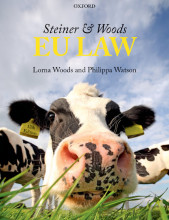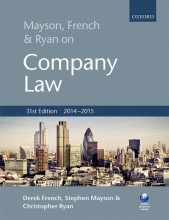Summary: Steiner And Woods Eu Law | 9780199685677 | Lorna Woods, et al
- This + 400k other summaries
- A unique study and practice tool
- Never study anything twice again
- Get the grades you hope for
- 100% sure, 100% understanding
Read the summary and the most important questions on Steiner and Woods EU Law | 9780199685677 | Lorna Woods; Philippa Watson
-
17 Customs Union: Discriminatory Taxation
This is a preview. There are 5 more flashcards available for chapter 17
Show more cards here -
Case 57/65 Lutticke v HZA
Article 110(1) TFEU is directly effective. -
17.1 Direct Discrimination
This is a preview. There are 3 more flashcards available for chapter 17.1
Show more cards here -
Commission v Ireland [1980]
Tax applied differently to all goods in respect of their origins.
Held: Tax is discriminatory. -
Bobie v HZA [1976]
Tax favoured domestic products were held discriminatory. -
17.2 Indirect Discrimination and Objective Justification
This is a preview. There are 1 more flashcards available for chapter 17.2
Show more cards here -
Humblot v Directeur des Services Fiscaux [1985]
A French car tax, calculated according to the power rating of the car, which imposed a disproportionately heavy burden on the more powerful cars, all of which were imported, was found to breach Article 110 TFEU/ -
Feldain v Directeur des Services Fiscaux [1987]
Although the previous French car tax was reformed, it still wasn't complying with Article 110. The taxation is discriminatory because cars with high power rating still required to pay high taxes. -
Chemical Farmaceutici v DAF [1981]
Synthetic ethanol was taxed higher in Italy to favour the farmers who manufactured domestic alcohol. This is because Italy government wanted to get rid of synthetic ethanol because it is polluting. To impose higher tax on it would prevent it from being used. Such measure was held to be justified. -
Commission v France [1987]
France imposed lower tax on sweet wines which were mostly produced by local farmers whereas ordinary wines were subjected to higher tax. The purpose of the special rate was to bolster the economy in areas largely dependent on the production of sweet wines, to compensate for the rigorous conditions which they are produced. The Court held that the economic policy objectives pursued by the French to be justified. -
Commission v Greece [1990]
Greece government applied tax rate based on the number of cylinder of the car engine. The Court held that there is no objective justification behind this. Despite this, Greeks produced cars with lesser cylinders, thus, more environmental friendly. So, the Court held that such measure is allowed because the reason behind the measure is to protect the environment. -
17.3 Article 110(1): Similar Goods
This is a preview. There are 2 more flashcards available for chapter 17.3
Show more cards here -
Commission v Denmark (case 106/84)
Similar goods "have similar characteristics and meet the same needs from the point of view of consumers...not according to whether they are strictly identical but whether their use is similar or comparable". -
Commission v Italy (Bananas)
The CJ had to determine whether bananas were 'similar' fruit for the purposes of Article 110(1) TFEU. The Court took into account the objective characteristics of bananas and other fruit, including the extent to which they could satisfy the same consumer need.
Held: The bananas were not similar to other fruit.
- Higher grades + faster learning
- Never study anything twice
- 100% sure, 100% understanding
































